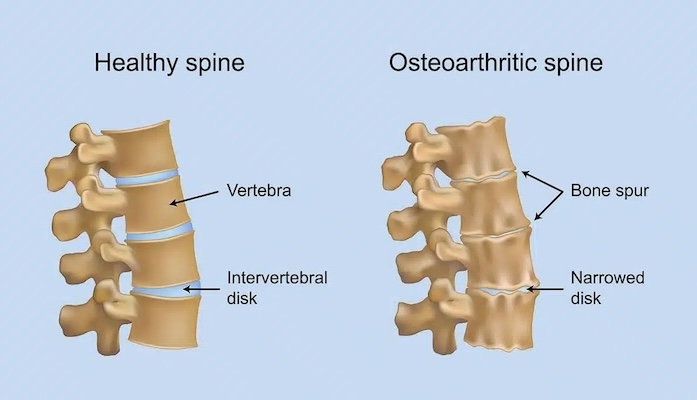
Spinal arthritis, also known as osteoarthritis of the spine, is a common condition that affects millions of Americans, causing pain, stiffness, and decreased mobility. As we age, the cartilage that cushions the joints in our spine can wear down, leading to inflammation, discomfort, and in severe cases, a loss of function. Fortunately, advances in interventional pain management offer targeted relief for those suffering from spinal arthritis.
At Precision Pain Care and Rehabilitation, we specialize in managing chronic pain conditions like spinal arthritis. Through a combination of advanced diagnostic tools and minimally invasive treatments, we can help patients regain their quality of life and avoid the need for more invasive procedures like surgery.
What is Spinal Arthritis?
Spinal arthritis occurs when the cartilage between the joints in the spine, called the facet joints, breaks down over time. This degeneration causes friction between the bones, leading to inflammation, pain, and stiffness. While osteoarthritis is the most common form, rheumatoid arthritis and other inflammatory conditions can also affect the spine.
Symptoms of spinal arthritis typically include:
- Persistent back or neck pain
- Stiffness, especially after periods of inactivity
- Reduced range of motion
- Pain that worsens with movement or physical activity
- Tingling or numbness if nerves are affected
These symptoms can significantly interfere with daily activities, making it difficult to perform tasks such as bending, lifting, or even walking.
Causes and Risk Factors
Several factors can contribute to the development of spinal arthritis, including:
- Age: The risk of developing arthritis increases with age, as wear and tear on the joints accumulate over time.
- Genetics: A family history of arthritis can make you more susceptible to developing the condition.
- Obesity: Excess weight places additional stress on the joints, including those in the spine.
- Injury: Previous spinal injuries can accelerate the degeneration of cartilage in the spine.
- Repetitive Motion: Jobs or activities that require repetitive spinal movement can increase the likelihood of developing arthritis.
How Interventional Pain Management Can Help
Interventional pain management offers a variety of non-surgical treatments designed to target the source of pain and provide long-term relief. These treatments are particularly effective for managing the chronic discomfort associated with spinal arthritis.
At Precision Pain Care and Rehabilitation, we utilize several cutting-edge interventional techniques, including:
- Facet Joint Injections
Facet joint injections deliver a combination of a local anesthetic and anti-inflammatory medication directly into the affected joint. This reduces inflammation and provides pain relief, allowing for improved mobility and function. The effects can last for several weeks or even months, depending on the individual.
- Radiofrequency Ablation (RFA)
Radiofrequency ablation is a minimally invasive procedure that uses heat generated by radio waves to target and "deactivate" the nerves responsible for transmitting pain signals from the arthritic facet joints. RFA can provide long-lasting relief, often for six months to a year or more.
- Epidural Steroid Injections (ESI)
While epidural steroid injections are commonly used for nerve-related pain, they can also be effective for treating spinal arthritis. These injections reduce inflammation in the spinal area, which helps alleviate pain and improve function. This approach is particularly helpful if arthritis is affecting nearby nerves.
- Spinal Cord Stimulation (SCS)
For patients with severe, unrelenting pain, spinal cord stimulation may be an option. This technique involves implanting a small device that delivers electrical impulses to the spinal cord, interrupting the pain signals before they reach the brain. SCS can provide significant relief for individuals who haven’t responded to other treatments.
The Benefits of Interventional Pain Management
Interventional pain management focuses on treating pain at its source rather than masking symptoms with medication. Some key benefits include:
- Minimally Invasive: Most procedures are performed on an outpatient basis with minimal recovery time.
- Targeted Relief: By focusing on the exact cause of pain, these treatments can provide more effective and lasting results.
- Reduced Need for Opioids: With the opioid crisis in mind, interventional pain management offers non-opioid solutions for long-term pain control.
- Improved Quality of Life: These treatments can significantly improve a patient’s ability to move, function, and participate in daily activities.
Living with Spinal Arthritis: What You Can Do
While interventional pain management can provide substantial relief, there are other steps you can take to manage spinal arthritis and improve your overall well-being:
- Stay Active: Regular low-impact exercise, such as walking, swimming, or yoga, can help maintain flexibility and strength in your spine.
- Maintain a Healthy Weight: Reducing excess weight can decrease pressure on the spine and alleviate symptoms.
- Heat and Cold Therapy: Alternating between heat and cold packs can help reduce inflammation and relieve pain.
- Physical Therapy: Working with a physical therapist can help you develop a personalized exercise program that improves strength, flexibility, and function.
Conclusion
Spinal arthritis can be a debilitating condition, but with the right care, it’s possible to manage pain and restore mobility. At Precision Pain Care and Rehabilitation, we specialize in interventional pain management, offering state-of-the-art treatments that target the root cause of your discomfort. If you or a loved one is struggling with spinal arthritis, contact us to learn more about the options available for relief and improved quality of life.
Precision Pain Care and Rehabilitation has two convenient locations in Richmond Hill – Queens, and New Hyde Park – Long Island. Call the Queens office at (718) 215-1888 or (516) 419-4480 for the Long Island office to arrange an appointment with our Interventional Pain Management Specialists, Dr. Jeffrey Chacko or Dr. Sonny Ahluwalia.















